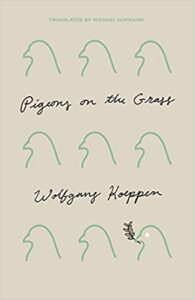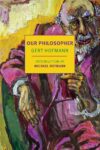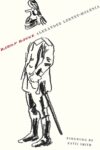
[New Directions Publishing; 2020]
Tr. from the German by Michael Hofmann
With Michael Hofmann’s translation of Pigeons on the Grass by Wolfgang Koeppen, New Directions continues its rediscovery of postwar German-language literature. Chronicling the lives of several Munich residents over the course of a day in 1948, Pigeons on the Grass revels in a variety of literary influences, from James Joyce’s Ulysses to Alfred Döblin’s Berlin Alexanderplatz. Koeppen incorporates these Modernist echoes into his own democratic style, mixing tabloid headlines with Homeric allusions, postwar victors with wretched losers, and not-so-former Nazis with the racial minorities they persecuted. While Koeppen’s stream of consciousness encompasses a broad cross section of the city, its inclusion of African-American characters carries special urgency. A testimony to Koeppen’s unique and largely overlooked literary legacy, the portrayal of a Black American serviceman in Pigeons on the Grass transforms the German literary antihero, introducing a strain of optimism and even utopianism in an attempt to find belonging and connection.
The disaffected young man, unmoored from society and frequently a victim of the military-industrial complex, was a familiar presence in early twentieth-century German novels and dramas. By the postwar era, rebellious Expressionist sentiment had long since given way to the icy defiance of “rubble literature [Trümmerliteratur]” that arose in Nazism’s aftermath. Reclaiming the German language from Hitler’s excesses, these works focused on veterans and POWs set adrift in a grim world. Produced for radio just a year before the events of Pigeons on the Grass, Wolfgang Borchert’s play The Man Outside [Draußen vor der Tür] carries this theme to extremes, depicting a soldier rejected by his community and even by death when he attempts suicide. Koeppen’s engagement with this gloom-and-doom trend proves complex. On one level, there is more than a trace of disillusionment in Philipp, a tortured novelist unable to love. Yet the Black inhabitants of Munich, who encounter relentless discrimination without resorting to despair, pose a challenge to the old formula of an inevitable dark fate. They prove an anomaly in a cast of often closed-minded characters, never losing sight of their identities while grappling with a hostile world. U.S. Army Sergeant Washington Price recognizes the bitter irony that while he was decorated for valor in the fight against Nazism, he experiences prejudice both at home and abroad. Desperate to keep his pregnant German girlfriend, Carla Behrend, he still believes that “every citizen deserves an even break. Every [B]lack man too.” The hypocrisy that surrounds him is at once nuanced and cruel, cloaking overt racism with a shallow admiration for American victors and their prosperity. When he walks into a department store for baby clothes, aware that he would have been “clubbed to death” for doing so back in Louisiana, the salesgirl reflects how she wouldn’t like to be “carrying a child of one of them.” Carla’s son, Heinz, struggles with the prospect of a Black stepfather, recognizing his race as “a striking, unignorable mark of otherness” despite his money and kind personality. Couched in suffocating racism, the trauma facing this veteran feels more visceral than the listlessness of Wehrmacht deserters scattered throughout German postwar fiction. Washington Price never resorts to nihilism, however. Instead, he takes refuge in the limited avenues of connection accessible to him: commercial goods and sports. Driving through Munich in a “sky-blue limousine,” he regularly buys “cigarettes, cans, coffee, chocolate” for Carla’s friends and neighbors, despite their ingratitude. Sportsmanship remains key to his pride and conviction. Like Jesse Owens facing down Nazism in the 1936 Berlin Olympics, he sustains hope that his athletic prowess can overcome injustice. As a star player in a baseball game, he proclaims himself “hero of the stands,” imagining an alternative world: “He was a free citizen of the United States. There was no discrimination.” Although the rejection he faces from every quarter aligns with the alienated antihero, his determination and ambition create a unique literary prospect, a heady clash between American exceptionalism and German cultural disillusionment.
What is the significance of this optimism? In one sense, it acts as a predecessor to an odd utopian strain in European and American postwar fiction — a longing for distant chivalric worlds evident in Ingeborg Bachmann’s Malina or Vladimir Nabokov’s Pale Fire. During a phone call with his family, the novel imbues Washington with similar gallantry, describing him as “Sir Washington doing battle against prejudice and ostracism.” Yet his dream of a life without segregation — starting a bar in Paris with a “None Unwelcome” sign — forms a moral core within the novel, a counterpart to American materialism and a cynical German outlook, enduring any hypocrisy for survival. Viewed through a more skeptical lens, this rosy vision may well seem its own racial stereotype: a two-dimensional, perpetually happy caricature set against the backdrop of a tortured city. After all, by 1948 (the year in which Pigeons on the Grass takes place), James Baldwin had begun drafts for Another Country — a novel that would chronicle an imploding interracial relationship in far grittier terms than a knight errant and his lady love. But as the day progresses, it becomes clear that Washington’s positive disposition is a hard-won choice in the face of adversity. Despite his insistence that true love conquers all, Carla is reluctant to continue their relationship, and frantically tries to gain admittance to an under-the-radar abortion clinic. Though his eleventh-hour intervention prevents her from going through with the procedure, he is hardly oblivious to their ugly dynamic. As she continually reminds him “how much she [is] abasing herself for him,” he attempts to compensate for her disgust with “more love, more presents, more sacrifices, and it helped but only a very little.” In the midst of a bitter argument, while refusing to give in to his worst instincts to hit her or leave, he realizes that “he didn’t want to break the bond that was beginning to tear, the bond between black and white, he wanted to tighten it by having a child together . . . and maybe his faith demanded martyrs as well.” This telling exchange cements his departure from the doomed German antihero, elevating his drive towards desegregation to a religious vision, albeit with a high cost. Unlike Franz Biberkopf of Berlin Alexanderplatz, struck down by fate with “monstrous and extreme violence,” Washington Price continues undaunted on the path to redemption. Even in his saddest moments, listening to a lonely Duke Ellington song and feeling “the whole ugliness of human existence,” he remains fixated on the “fata morgana” of “the baby that he and Carla were going to bring into the world.” The “fata morgana,” at once hinting at a false mirage and medieval sorceress Morgan le Fay, might suggest the dangerous aspects of his faith, but it has undeniable staying power. Caught in the crossfire of a mob attack on the Black American soldiers’ club that evening, Carla and Washington remain unmoved; the stones may “hit the dream of Paris, the dream of Washington’s Bar . . . but they couldn’t kill the dream, which is stronger than any stone-throwing.” Capturing a world of postwar American bravado and shaky transatlantic alliances, Pigeons on the Grass may encompass a bygone cityscape, but its inclusion of a troubled yet triumphant interracial relationship feels resonant to our current moment of international reckoning with racial injustice. Countering systemic prejudice with determined idealism, Washington Price’s character proves a poignant anomaly in the gloomy depths of midcentury German fiction — a feat that may finally earn an overlooked novelist some long-overdue critical attention.
Emily Hershman received a Ph.D. in English at the University of Notre Dame. Her writing has appeared in the James Joyce Quarterly and elsewhere.
This post may contain affiliate links.







